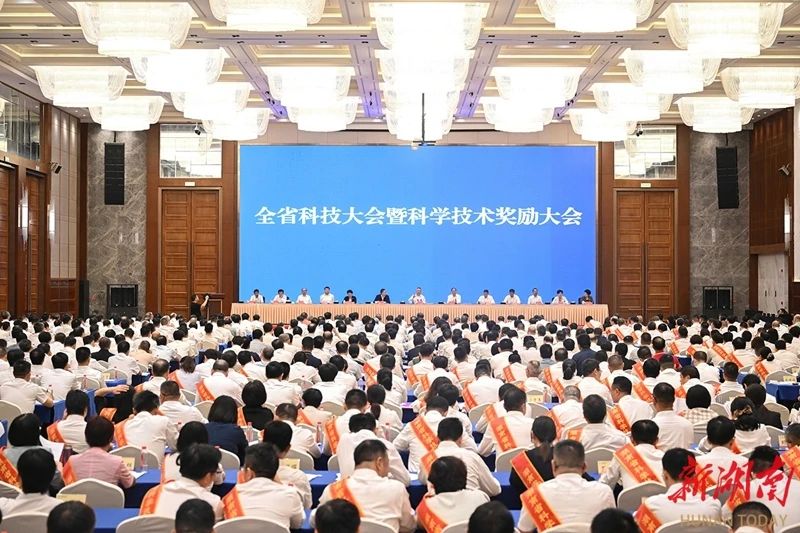On September 3, the Hunan Provincial Science and Technology Conference and Awards Ceremony were held in Changsha. Hunan Provincial Party Secretary Shen Xiaoming and Governor Mao Weiming attended and delivered speeches. Other notable attendees included Mao Wanchun, Chairman of the Hunan Provincial Committee of the Chinese People’s Political Consultative Conference, and other provincial leaders. Academician of the Chinese Academy of Sciences and Engineering, President of Central South University Li Jiancheng,AcademicianTian Hongqi,Vice Chairwoman of the Central Committee of the Chinese Kuomintang Revolutionary Committee, and Chairwoman of the Hunan Association for Science and Technology, and Chen Xiang, Executive Vice President of Central South University, Dean of Xiangya School of Medicine, and Director of the Furong Laboratory, also participated. Vice Presidents of Central South University Guo Xueyi and Li Zhihong were present as well. Representing Xiangya School of Medicine, Party Secretary Chang Shi, Executive Vice Dean Wu Minghua, and Vice Deans Huang Zhijun and Liu Hong attended the event as award recipients.

Xiangya School of Medicine, as the primary institution, was honored with 23 scientific research awards, covering major fields such as oncology, cardiovascular diseases, gastroenterology, respiratory diseases, orthopedics, dentistry, and nursing. Professor Liu Hong of Xiangya Hospital led the project "Mechanisms of Tumorigenesis and Therapeutic Resistance in Melanoma and Other Solid Tumors”, which received First Prize in the Natural Science category. Professor Jiang Canhua’s project “Personalized Craniofacial Implant Shaping Robot and Precision Jaw Surgery Technology” won First Prize for Technological Invention. Additionally, Professor Zhang Yongchang of Xiangya School of Medicine’s Affiliated Cancer Hospital led the project “Development and Application of a Molecular Targeted Precision Treatment System for EGFR-Mutant Lung Cancer”, which earned First Prize in Scientific and Technological Progress. Xiangya School of Medicine also received 12 Second Prizes and 8 Third Prizes across various categories.
Looking ahead, Xiangya School of Medicine will be guided by the “High-Quality Development Plan for Central South University’s Medical Field”. The school will seize historic opportunities, stay aligned with global scientific advancements and China’s national strategic needs, and use its innovative achievements to drive breakthroughs in medical technology. By nurturing talent and fostering innovation, Xiangya aims to contribute more significantly to life sciences, biotechnology, and medical equipment, propelling the medical field to new heights and providing robust technological support for high-quality development.
Appendix: First Prize Project Summaries
Award Category: First Prize in Natural Science
Project Title: Mechanisms of Tumorigenesis and Therapeutic Resistance in Melanoma and Other Solid Tumors
Team Members: Liu Hong, Ye Mao, Liu Jing, et al.
Institutions: Xiangya Hospital, Central South University
Summary: This project made groundbreaking discoveries in the targeted treatment and immunotherapy of melanoma and other solid tumors. Using innovative techniques like targeted drug screening, the team developed a novel immunotherapy strategy combining key molecules such as MMP, and designed molecular probes for drug-resistant melanoma. Their findings have been published in leading international journals, such as PNAS, and cited in top-tier publications like Nature Reviews Cancer and Nature Reviews Clinical Oncology. The research has gained widespread recognition from global experts, including Peter Di-ike from the Royal Netherlands Academy of Arts and Sciences.
Award Category: First Prize in Technological Invention
Project Title: Personalized Craniofacial Implant Shaping Robot and Precision Jaw Surgery Technology
Team Members: Jiang Canhua, Liang Ye, Zuo Guokun, et al.
Institutions: Xiangya Hospital, Central South University
Summary: After a decade of research, the team developed the world’s first “personalized craniofacial implant shaping robot,” achieving a pioneering “isomaterial digital shaping” technique for implants. The team also developed software that can design personalized implants based on imaging data and introduced an AI solution to predict 3D bone morphology. Clinical applications have shown that this technology improves surgical efficiency, shortens hospital stays, reduces complications, and lowers costs. Experts have rated the key technology as world-leading in the field.
Award Category: First Prize in Scientific and Technological Progress
Project Title: Development and Application of a Molecular Targeted Precision Treatment System for EGFR-Mutant Lung Cancer
Team Members: Zhang Yongchang, Yang Nong, Zeng Liang, et al.
Institutions: Xiangya School of Medicine’s Affiliated Cancer Hospital
Summary: This project focused on the molecular classification of lung cancer, making key breakthroughs in identifying and overcoming resistance to EGFR-targeted therapies. The research provided detailed insights into EGFR mutation subtypes and resistance mechanisms, developed a risk assessment system, and refined treatment strategies. The core results have been published in leading journals such as Journal of Thoracic Oncology, European Journal of Cancer, and BMC Medicine. The findings have been incorporated into several international guidelines, greatly improving lung cancer outcomes and reducing the economic burden on patients.
(Reviewed by Liu Juan, Li Ruijun, Huang Zhijun)
